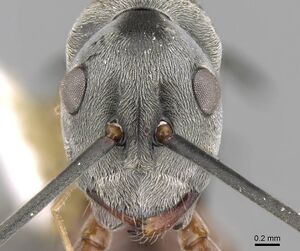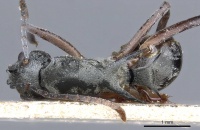Polyrhachis retrorsa
| Polyrhachis retrorsa | |
|---|---|

| |
| Scientific classification | |
| Kingdom: | Animalia |
| Phylum: | Arthropoda |
| Class: | Insecta |
| Order: | Hymenoptera |
| Family: | Formicidae |
| Subfamily: | Formicinae |
| Tribe: | Camponotini |
| Genus: | Polyrhachis |
| Subgenus: | Myrmhopla |
| Species: | P. retrorsa |
| Binomial name | |
| Polyrhachis retrorsa Emery, 1900 | |
Specimens have been collected from fogging samples in natural forest and within an elevation range of 400-1080m.
Identification
A member of the Polyrhachis mucronata species group.
Kohout (2008) - Polyrhachis retrorsa bears a very close resemblance to Polyrhachis mitrata from the Philippines but direct comparison of the types of both species supports their separate specific status. Polyrhachis mitrata has a narrower mesosoma with the pronotal humeri angular and the propodeal and petiolar spines distinctly more slender. The petiole in lateral view has a weakly convex anterior face, an almost straight posterior face and a rather narrow dorsum that bears a pair of minute, posteriorly directed, intercalary teeth. Polyrhachis mitrata is black with the legs and gaster medium reddish-brown and the antennae a shade darker and the body is covered with whitish pubescence that is rather diluted, notably on dorsum of the head, mesosoma and gaster. However, the syntype examined appears to be a worn specimen. In contrast, the pronotal humeri in P. retrorsa are unarmed and widely rounded and the propodeal spines shorter and broader at their bases. In profile, both faces of the petiole are convex and only slightly converge towards the widely rounded dorsum. The petiole generally lacks intercalary teeth, although rudimentary teeth are evident beneath the pubescence in a few specimens. Polyrhachis retrosa is black with reddish-brown appendages and has relatively long, appressed, silvery-grey pubescence that clearly distinguishes the species from the other, mostly jet black members of the mucronata-group.
Keys including this Species
Distribution
Latitudinal Distribution Pattern
Latitudinal Range: -2.183333° to -2.183333°.
| North Temperate |
North Subtropical |
Tropical | South Subtropical |
South Temperate |
- Source: AntMaps
Distribution based on Regional Taxon Lists
Indo-Australian Region: Indonesia (type locality).
Distribution based on AntMaps
Distribution based on AntWeb specimens
Check data from AntWeb
Countries Occupied
| Number of countries occupied by this species based on AntWiki Regional Taxon Lists. In general, fewer countries occupied indicates a narrower range, while more countries indicates a more widespread species. |

|
Estimated Abundance
| Relative abundance based on number of AntMaps records per species (this species within the purple bar). Fewer records (to the left) indicates a less abundant/encountered species while more records (to the right) indicates more abundant/encountered species. |

|
Biology
Castes
Worker
Images from AntWeb
   
| |
| Worker. Specimen code casent0906772. Photographer Michele Esposito, uploaded by California Academy of Sciences. | Owned by NHMUK, London, UK. |
Nomenclature
The following information is derived from Barry Bolton's Online Catalogue of the Ants of the World.
- retrorsa. Polyrhachis retrorsa Emery, 1900d: 719 (w.q.) INDONESIA (Mentawei I.). Combination in P. (Myrmhopla): Emery, 1925b: 196.
Unless otherwise noted the text for the remainder of this section is reported from the publication that includes the original description.
Description
Type Material
Kohout (2008) - Syntype worker, queens. INDONESIA, Mentawei I., Sipora, Sereinu (E. Modigliani), Museo Civico di Storia Naturale, Genoa (examined).
References
- Emery, C. 1900d. Formiche raccolte da Elio Modigliani in Sumatra, Engano e Mentawei. [part]. Ann. Mus. Civ. Stor. Nat. 40[=(2(20): 689-720 (page 719, worker, queen described)
- Emery, C. 1925d. Hymenoptera. Fam. Formicidae. Subfam. Formicinae. Genera Insectorum 183: 1-302 (page 196, Combination in P. (Mymrhopla))
- Kohout, R.J. 2008a. A review of the Polyrhachis ants of Sulawesi with keys and descriptions of new species (Hymenoptera: Formicidae: Formicinae). Memoirs of the Queensland Museum. 52:255-317.
References based on Global Ant Biodiversity Informatics
- Chapman, J. W., and Capco, S. R. 1951. Check list of the ants (Hymenoptera: Formicidae) of Asia. Monogr. Inst. Sci. Technol. Manila 1: 1-327
- Emery, C. "Formiche raccolte da Elio Modigliani in Sumatra, Engano e Mentawei." Annali del Museo Civico di Storia Naturale Giacomo Doria (Genova) (2) 20, no. 40 (1900): 661-722.
- Kohout, R. J. 2008. A review of the Polyrhachis ants of Sulawesi with keys and descriptions of new species (Hymenoptera: Formicidae: Formicinae). Memoirs of the Queensland Museum 52:255-317.
- Robson Simon Database Polyrhachis -05 Sept 2014

